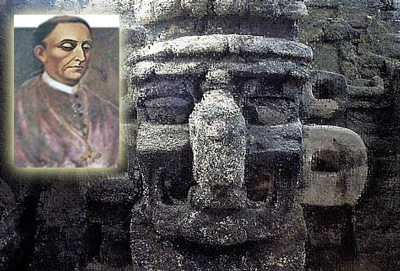Page 1 Page 2 Page 3 Page 4 Page 5

Where do I begin? How can I explain my actions? Where does memory fade and when do we forgive the heinous acts of history? I only know what I know. And I cannot stop the sequence of events that must occur. Itzam`na (“Dew from Heaven”) whispers in my ear, “We are the Maya and this is our land.”
I am Luca. I was born in 1970. I am a poor Mayan child, now just ten years old. We worked hard, my family and me. My father had died when I was five. Still, we got by. My mother raised us up in the church. The Catholic Church. How beautiful that Mission was! We felt special to have such a grand house of worship. It was built in 1561. Beautiful stones, some with strange swirls on them, were used throughout. Seventy- five arcades form the facade of the structure of the Franciscan Convent of San Antonio de Padua. The atrium inside those walls is said to be second in size only to St. Peter’s Square in Rome. Prominently displayed in our convent hangs a portrait of Friar Diego de Landa, the first Bishop of the Yucatan. For me, that portrait was holy. After all, we were blessed to have our land chosen for this splendid structure. Frey Landa , in our minds, was at the right hand of God. We would always have the strength of the church to see us through misfortune. In more than one way the church was our rock.
The old ones — the viejos — sat, as was their habit, in the brilliant mid-morning sun. Their backs were against the bright yellow walls of one of the town’s buildings. The convent is painted a particular shade of yellow, and the town’s buildings are painted to match. Izamal (City of Hills in Mayan) has become known as the “Yellow Town.” Bitol, crouching, held a match to his thin hand-rolled cigarette. He squinted at his good friend Kawil. “So this pup, this town dog, comes to sit at our feet today, heh?” He looked through me, and I was trying, unsuccessfully, to make myself less conspicuous. “Go away, town pup. We have no scraps for you.”
Kawil looked me over and says, “Ah, let him stay, Bitol. We can make him fetch us horchatas or aquas frescas later on.”
Bitol, steel in his voice, replied, “You can stay, Little Dog. But remember this: whatever we say here, stays here.” I nod my head solemnly.
They spoke slowly and of many things. Old men are that way. Thoughts and memories come either in a flood or in a trickle. They voice them immediately, lest they be forgotten again. More and more they live in the past. They are unable to work as they once had. Life has left them with this: a few good friends, a patch of sunny sidewalk, and a measure of experience. Melancholy about some things, reverential about others, the hard knocks of life had made them philosophers.
“Kawil, do you remember your father’s father?” Bitol asked.
“No, I barely remember my father,” Kawil replied.
“Think, Kawil. I remember him, or at least what I heard told of him. He was named Kan-u-Uayeyab, for the God who protects cities. We called him ‘Kanyeb’.”
“I remember now,” Kawil said. “I think part of me wants to forget the shame he brought upon our family.”
Bitol thought awhile and said, “It’s no shame to love your home. It’s no shame to protect what is yours. Why do you think he did it ?”
I, standing aside these two, could only wonder what had happened; I dared not ask. “It was bad for my family for a long time,” Kawil said. “We were banned from the church and shunned by the people.”
The clip-clop of a horse pulling a calesa echoed softly down the cobblestone street. Itzam`na whispered again, “I told him to do it.” I wondered if the two old men also heard that whisper, but I said nothing.
“Hey, we’re thirsty. Take these coins and get us horchatas. And bring my change, Perro!” I snapped to attention, a soldier with a mission to perform. “Oh, and get one for yourself, Muchachito.” I took the money and, with a broad smile on my face, I was off at a furious clip.
When I returned I handed over the drinks and the change. I heard the last bit of Kawil’s speech, “And so, he found out what had been lost and forgotten. What a shock!” I wondered what had been found out. Of course, I wanted to ask, but something made me wait. I knew, even at my age, the wisdom of patience. Tomorrow I would return to sit at the knees of the viejos. Later would come the sadness, when I would learn more than I would want to know.


I can,t wait for the next installment. It seems like a lot of research went into this. WELL DONE!
Vividly told. I could see the yellow walls and hear the clip clopping of the horse. Looking forward to the rest of this story.